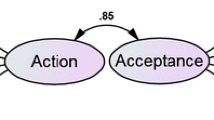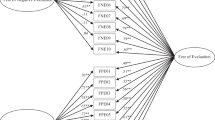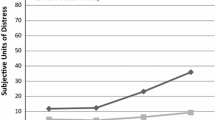Abstract
The recent emphasis on cognitive factors in the treatment of emotional problems has stimulated the development of cognitive assessment techniques. This paper presents the development and initial validation of an instrument to assess self-statements about social interactions. The 30-item questionnaire contains 15 positive (facilitative) and 15 negative (inhibitory) self-statements that were derived from subjects who listed thoughts while imagining difficult social situations. Item selection was accomplished by using judges' ratings of those thoughts. Validity studies with two samples compared scores on the self-statement measure with self-report, judges' and confederates' ratings of skill and anxiety following taped role-play and face-to-face interactions, and with questionnaire measures of social anxiety and skill. The measure appears to be a reliable, valid measure of cognitions associated with social anxiety. Research directions in cognitive assessment are suggested.
Similar content being viewed by others
Reference Notes
Cone J. D.Multitrait-multimethod matrices in behavioral assessment. Paper presented at the meeting of the American Psychological Association, Washington, D.C., September 1976.
Kelly, J. A., O'Brien, C. G., Hosford, R. L., & Kinsinger, R. L.Sex roles and social skills: A behavioral analysis of “masculinity,” “femininity,” and “psychological androgyny.” Paper presented at the meeting of the Association for Advancement of Behavior Therapy, New York, December 1976.
Burchardt-Pharr, C. J., & Serbin, L. A.The relationship of sex-role identity to personality adjustment and behavioral assertiveness. Paper presented at the meeting of the Association for Advancement of Behavior Therapy, Atlanta, December 1977.
Sutton-Simon, K., & Goldfried, M. R.A task analysis of cognitive processes in social anxiety. Manuscript submitted for publication, 1980.
Rhyne, L. D., Hanson, T. R., & Claiborn, J.An analysis of the response deficit in nonassertive inpatients. Manuscript submitted for publication, 1979.
Glass, C. R., & Merluzzi, T. V.Approaches to the cognitive assessment of social anxiety. Symposium: The assessment of cognitive processes and events. Presented at the meeting of the Association for Advancement of Behavior Therapy, Chicago, November 1978.
References
Arkowitz, H., Lichtenstein, E., McGovern, K., & Hines, P. The behavioral assessment of social competence in males.Behavior Therapy 1975,6 3–13.
Bandura, A.Principles of behavior modification. New York: Holt, Rinehart & Winston, 1969.
Beck, A. T.Cognitive therapy and the emotional disorders. New York: International Universities Press, 1976.
Bellack, A. S. A critical appraisal of strategies for assessing social skill.Behavioral Assessment 1979,1 157–176.
Bem, S. L. The measurement of psychological androgyny.Journal of Consulting and Clinical Psychology 1974,42 155–162.
Biever, J. L.The effects of sex-role identity, type of situation, and sex of stimulus person on skill, anxiety, and cognitions in social situations. Unpublished master's thesis, University of Notre Dame, 1979.
Cacioppo, J. T., Glass, C. R., & Merluzzi, T. V. Self-statements and self-evaluations: A cognitive response analysis of heterosocial anxiety.Cognitive Therapy and Research 1979,3 249–262.
Cacioppo, J. T., & Petty, R. E. Social psychological procedures for cognitive response assessment: The thought listing technique. In T. V. Merluzzi, C. R. Glass, & M. Genest (Eds.),Cognitive assessment. New York: Guilford Press, 1981.
Clark, J. V., & Arkowitz, H. Social anxiety and self-evaluation of interpersonal performance.Psychological Reports 1975,36 211–221.
Curran, J. P. Skills training as an approach to the treatment of heterosexual-social anxiety: A review.Psychological Bulletin 1977,84 140–157.
Curran, J. P., & Gilbert, F. S. A test of the relative effectiveness of a systematic desensitization program and an interpersonal skills training program with data anxious subjects.Behavior Therapy 1975,6 510–521.
Curran, J. P., Gilbert, F. S., & Little, L. M. A comparison between behavioral replication training and sensitivity training approaches to heterosexual dating anxiety.Journal of Counseling Psychology 1976,23 190–196.
Curran, J. P., Wallander, J. L., & Fischetti, M. The role of behavioral and cognitive factors in heterosexual-social anxiety.Journal of Personality 1980,48 285–292.
Ellis, A., & Grieger, R.Handbook of rational-emotive therapy. New York: Springer, 1977.
Galassi, J. P., & Galassi, M. D. Modification of heterosocial skills deficits. In A. S. Bellack & M. Hersen (Eds.),Research and practice in social skills training. New York: Plenum Press, 1979.
Glasgow, R. E., & Arkowitz, H. The behavioral assessment of male and female social competence in dyadic heterosexual interactions.Behavior Therapy 1975,6 488–498.
Glass, C. R., Gottman, J. M., & Shmurak, S. Response acquisition and cognitive self-statement modification approaches to dating-skills training.Journal of Counseling Psychology 1976,23 520–526.
Glass, C. R., & Merluzzi, T. V. Cognitive assessment of social-evaluative anxiety. In T. V. Merluzzi, C. R. Glass, & M. Genest (Eds.),Cognitive assessment. New York: Guilford Press, 1981.
Goldfried, M. R., & D'Zurilla, T. J. A behavioral-analytic model for assessing competence. In C. D. Spielberger (Ed.),Current topics in clinical psychology (Vol. 1). New York: Academic Press, 1969.
Goldfried, M. R., & Pomeranz, D. M. Role of assessment in behavior modification.Psychological Reports 1968,23 75–87.
Goldfried, M. R., & Sobocinski, D. Effect of irrational beliefs on emotional arousal.Journal of Consulting and Clinical Psychology 1975,43 504–510.
Henshaw, D.A cognitive analysis of creative problem-solving. Unpublished doctoral dissertation, University of Waterloo, 1978.
Hersen, M., & Bellack, A. J. Assessment of social skills. In A. R. Ciminero, K. R. Calhoun, & H. E. Adams (Eds.),Handbook of behavioral assessment. New York: Wiley, 1977.
Himadi, W. G., Arkowitz, H., Hinton, R., & Perl, J. Minimal dating and its relationship to other social problems and general adjustment.Behavior Therapy 1980,11 345–352.
Hollon, S. D., & Kendall, P. C. Cognitive self-statements in depression: The automatic thoughts questionnaire.Cognitive Therapy and Research 1980,4 383–395.
Jones, R. G. A factored measure of Ellis' irrational belief system, with personality and maladjustment correlates (Doctoral dissertation, Texas Technological College, 1968).Dissertation Abstracts International 1969,29 4379B-4380B. (University Microfilms No. 69-6443)
Kanter, N. J., & Goldfried, M. R. Relative effectiveness of rational restructuring and self-control desensitization in the reduction of interpersonal anxiety.Behavior Therapy 1979,10 472–490.
Kendall, P. C., & Korgeski, G. Assessment and cognitive-behavioral intervention.Cognitive Therapy and Research 1979,3 1–21.
Kendall, P. C., Williams, L., Pechacek, T. F., Graham, L. E., Shisslak, C., & Herzoff, N. Cognitive-behavioral and patient education interventions in cardiac catheterization procedures: The Palo Alto medical psychology project.Journal of Consulting and Clinical Psychology 1979,47 49–58.
Larsen, K. H.The effects of social anxiety and videotape performance feedback on cognitions and self-evaluations. Unpublished master's thesis, University of Notre Dame, 1979.
MacDonald, M. L., Lindquist, C. U., Kramer, J. A., McGrath, R. A., & Rhyne, L. D. Social skills training: Behavior rehearsal in groups and dating skills.Journal of Counseling Psychology 1975,22 224–230.
Mahoney, M. J.Cognition and behavior modification. Cambridge, Massachusetts: Ballinger, 1974.
Malkiewich, L. E., & Merluzzi, T. V. Rational restructuring versus desensitization with clients of diverse conceptual levels: A test of a client-treatment matching model.Journal of Counseling Psychology 1980,27 453–461.
Martison, W. D., & Zerface, J. P. Comparison of individual counseling and a social program with nondaters.Journal of Counseling Psychology 1970,17 36–40.
McGovern, K. B., Arkowitz, H., & Gilmore, S. K. Evaluation of social skills training programs for college dating inhibitions.Journal of Counseling Psychology 1975,22 505–512.
Meichenbuam, D.Cognitive behavior modification: An integrative approach. New York: Plenum, 1977.
Miller, W. R., & Arkowitz, H. Anxiety and perceived causation in the social success and failure experiences: Disconfirmation of an attribution hypothesis in two experiments.Journal of Abnormal Psychology 1977,86 665–668.
Mitchell, K. R., & Orr, T. E. Note on treatment of heterosexual anxiety using short-term massed desensitization.Psychological Reports 1974,35 1093–1094.
O'Banion, K., & Arkowitz, H. Social anxiety and selective memory for affective information about the self.Social Behavior and Personality 1977,5 321–328.
Rehm, L. P., & Marston, A. R. Reduction of social anxiety through modification of selfreinforcement: An instigation therapy technique.Journal of Consulting and Clinical Psychology 1968,32 565–574.
Sarason, I. G. The test anxiety scale: Concept and research, In C. D. Spielberger & I. G. Sarason (Eds.),Stress and anxiety (Vol. 5). Washington, D. C.: Hemisphere, 1978.
Schwartz, R. M., & Gottman, J. M. A task analysis approach to clinical problems: A study of assertive behavior.Journal of Consulting and Clinical Psychology 1976,44 910–920.
Smye, M. D., & Wine, J. D. A comparison of female and male adolescents' social behaviors and cognitions.Sex Roles 1980,6 213–230.
Twentyman, C. T., & McFall, R. M. Behavioral training of social skills in shy men.Journal of Consulting and Clinical Psychology 1975,43 384–395.
Watson, D., & Friend, R. Measurement of social-evaluative anxiety.Journal of Consulting and Clinical Psychology 1969,33 448–459.
Williams, C. L., & Ciminero, A. R. Development and validation of a heterosocial skills inventory: The Survey of Heterosexual Interactions for Females.Journal of Consulting and Clinical Psychology 1978,46 1547–1548.
Author information
Authors and Affiliations
Rights and permissions
About this article
Cite this article
Glass, C.R., Merluzzi, T.V., Biever, J.L. et al. Cognitive assessment of social anxiety: Development and validation of a self-statement questionnaire. Cogn Ther Res 6, 37–55 (1982). https://doi.org/10.1007/BF01185725
Issue Date:
DOI: https://doi.org/10.1007/BF01185725




